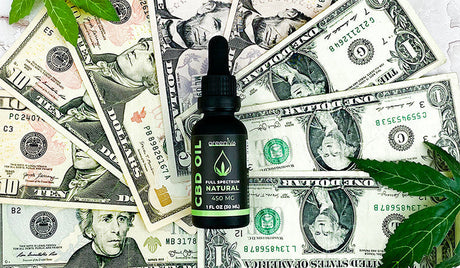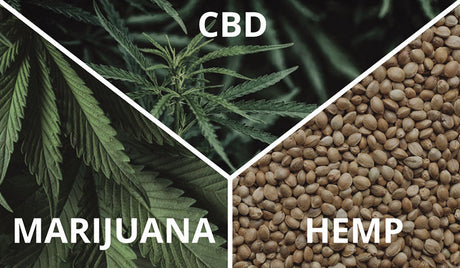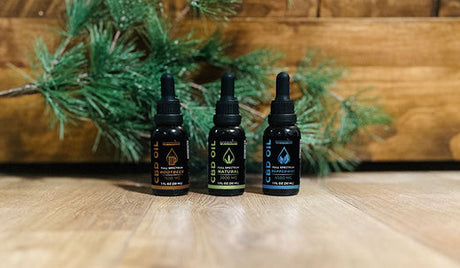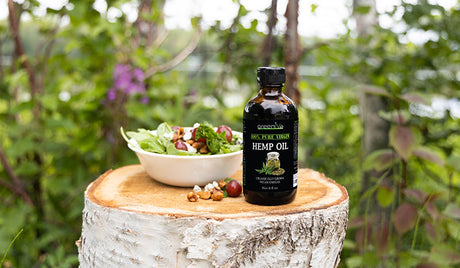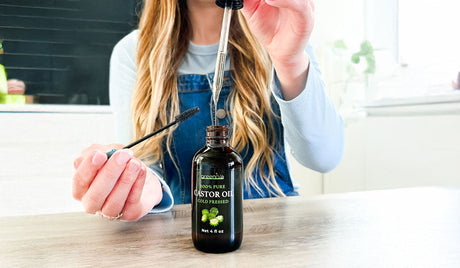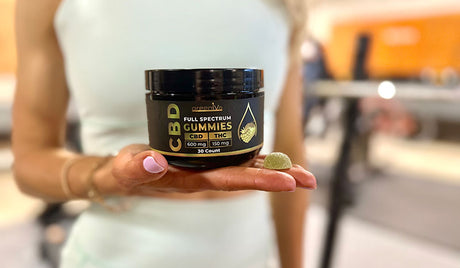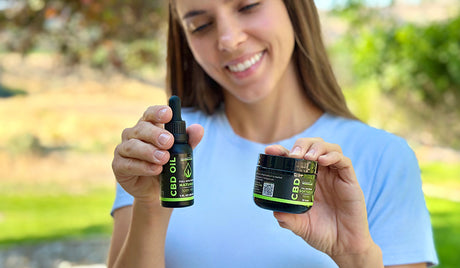The roar of the crowd, the burn in your muscles, the relentless drive to push your limits – the world of athletics constantly pursues peak performance. But with that pursuit comes the inevitable: discomfort, swelling, sleepless nights, and the ever-present weight of stress.
In this landscape of relentless physical and mental demands, athletes are constantly seeking an edge, a way to optimize recovery and enhance well-being. Enter Cannabidiol, or CBD, a natural compound rapidly gaining traction in locker rooms and training facilities worldwide.
From weekend warriors to elite professionals, the allure of CBD's potential benefits is undeniable. But is it a game-changer, or just another fleeting trend? This blog aims to cut through the hype and offer a balanced perspective on CBD for athletes.
We'll explore the promising advantages – the potential for pain relief, improved sleep, and reduced anxiety – while also shedding light on the crucial drawbacks, including regulatory uncertainties and potential side effects. Join us as we navigate the complex terrain of CBD and athletic performance, empowering you to make informed decisions about this increasingly popular supplement.
Understanding CBD
Cannabidiol, or CBD, is a naturally occurring compound found in the cannabis plant, distinct from its psychoactive counterpart, tetrahydrocannabinol (THC). CBD is a cannabinoid derived from the hemp plant.
CBD indirectly interacts with the endocannabinoid system (ECS) by influencing cannabinoid (CB1 and CB2) receptors and enzymes that break down natural cannabinoids. Although CBD doesn't directly bind to these receptors, it affects their signaling pathways in the central nervous system.
By inhibiting enzymes that break down natural cannabinoids like anandamide and 2-AG, CBD may increase their availability and effects. This interaction with the ECS is thought to contribute to CBD's therapeutic benefits for discomfort, mood, and sleep.
Its non-intoxicating nature, anecdotal evidence, and some scientific studies have sparked curiosity within the athletic community. Athletes are exploring the potential advantages CBD may offer, not only in terms of physical performance but also for mental well-being.
Potential CBD Benefits for Athletes
Athletes constantly push their bodies to the limit, and CBD is emerging as a potential tool to help them train, compete, and recover more effectively. Here's a deeper dive into some of the potential benefits:
Discomfort
During exercise, microscopic tears occur in muscle fibers, leading to post-workout soreness and swelling. CBD interacts with the body's endocannabinoid system, which regulates discomfort perception and swelling. Studies suggest CBD may help reduce these sensations, allowing for faster recovery and potentially mitigating discomfort from old injuries.

Enhanced Recovery
Beyond pain relief, CBD's anti-swelling properties may also contribute to a smoother overall recovery process. CBD could help muscles repair faster and minimize exercise-induced tissue damage by reducing swelling and oxidative stress. Additionally, some research suggests CBD may promote better sleep quality, another crucial factor in athletic recovery.
Worry and Focus
Pre-competition nerves and performance worries can be significant hurdles for athletes. CBD's potential anti-worry properties may help athletes manage these worries, allowing them to stay calmer and more focused during competitions. This can lead to improved performance and a clearer headspace for strategic decision-making.
Improved Sleep Quality
Deep, restorative sleep is essential for optimal athletic performance. More research is needed, but some studies show that CBD might help improve sleep by promoting relaxation and reducing disturbances. This can help athletes who have trouble sleeping because of their busy training schedule or when they travel for competitions.
Potential Drawbacks and Considerations
While CBD holds promise as an athlete supplement, it is crucial to consider some potential drawbacks and factors before incorporating it into training and recovery routines.
Limited Research
The exciting potential of CBD for athletes is balanced by the fact that research in this area is still emerging. While anecdotal evidence is promising, strong scientific data is crucial for definitive conclusions.
Athletes should consider:
- Uncertainty about Long-Term Effects: The long-term impacts of regular CBD use, especially for frequently consumed athletes, are unknown. More studies are needed to assess potential long-term risks.
- Optimal Dosage for Athletes: There is no one-size-fits-all CBD dosage. Research on optimal dosages specifically for athletes and their unique needs is lacking.
- Potential Interactions: CBD can interact with the body's system responsible for metabolizing medications and supplements. Athletes taking various supplements should be aware of this potential interaction.
Consulting a healthcare professional familiar with CBD use in athletes can help navigate these uncertainties and make informed decisions.

CBD Quality
While CBD offers potential benefits for athletes, ensuring high-quality products is key. Unlike regulated substances, CBD isn't currently overseen by the FDA in the US. This can lead to inconsistent formulations and unknown contents.
To navigate this, prioritize third-party lab testing. Reputable brands will have independent labs verify CBD potency, the presence of other cannabinoids (including THC), and potential contaminants. Look for brands that readily provide Certificates of Analysis (COAs) for transparency.
Beyond testing, quality control measures throughout production are crucial. Opt for brands with a transparent approach: sourcing hemp from sustainable farms, using safe CO2 extraction methods, and listing all ingredients.
By prioritizing quality and choosing reputable brands, athletes can ensure they're getting the most out of CBD and avoid any potential risks associated with products that don't meet high standards.
Medication Interaction
While CBD is generally well-tolerated, athletes must be aware of potential medication interactions. CBD interacts with the liver's cytochrome P450 system, a group of enzymes responsible for metabolizing many medications.
This means CBD could potentially alter how your body processes certain drugs, making them less effective or even leading to higher concentrations in your system and increased risk of side effects.
Athletes taking medications for pain, allergies, or other conditions should consult with a doctor or pharmacist before using CBD. They can check for interactions and suggest safe ways to manage pain or inflammation without affecting your medications.
Individual Variability
CBD affects individuals differently due to body chemistry, metabolism, genetics, and overall health. While some may experience significant benefits, others may have more subtle or minimal responses.

Understanding this individual variability is crucial when considering CBD use. The ECS varies among individuals, affecting how CBD interacts with the body. Receptor distribution and sensitivity can differ, making responses to CBD unique.
Dosage Considerations
Due to the individual variability in how bodies process CBD, there is no one-size-fits-all dosage for athletes. Factors like body weight, metabolism, and the desired effect all influence the amount needed.
It's recommended to start low and gradually increase until the desired results are achieved. Typically, you wait at least a week between dosage adjustments to gauge the effects. This helps you determine the appropriate dosage to achieve the desired benefits.
It prevents unwanted side effects such as fatigue or stomach problems from occurring when taking too much CBD. Consulting a healthcare professional familiar with CBD use in athletes can be especially helpful. They can guide you towards a personalized approach based on your needs and training regimen.
Additionally, they can ensure that there are no potential interactions with any medications you're taking and provide valuable advice on reputable CBD suppliers and product selection, considering the importance of third-party lab reports for athletes.
How Are Professional Athletes Using CBD?
CBD has gained attention in the athletic community, with many discussing its potential wellness benefits. Public discourse has highlighted how some athletes believe CBD can contribute to stress management, recovery, and overall well-being.
For example, discussions circulating online and in various media outlets suggest that some golfers have explored CBD oil for stress management, retired football players have considered it for post-career recovery, and MMA fighters have looked into its natural potential for reducing inflammation and avoiding prescription pain relievers.
It's important to note that these are examples of general discussions and should not be interpreted as endorsements of any specific product or brand. As more information becomes available, it is clear that athletes are exploring many avenues to improve recovery and overall bodily care.
CBD Products For Athletes
While research is ongoing, many athletes are finding CBD helpful for managing pain, inflammation, and anxiety. With a variety of CBD products available, here's a breakdown of what athletes might consider:
Delivery Method: Athletes have options for how they take CBD.
- Topicals: Creams, salves, and lotions applied directly to sore muscles or joints for localized pain relief and reduced inflammation.
- Orals: Tinctures (oils dropped under the tongue), capsules, and edibles (gummies, chews) offer a systemic approach that may take longer but can benefit overall recovery and promote better sleep.

CBD Type: The type of CBD extract can also be a factor.
- Full-spectrum CBD contains all the cannabinoids naturally found in the cannabis plant, including trace amounts of THC (usually less than 0.3%). It may offer the entourage effect, where all the compounds work together for a potentially stronger benefit. However, there's a small chance it could appear on a drug test.
- Broad-spectrum CBD removes most THC while keeping other beneficial cannabinoids.
- CBD isolate is pure CBD with no other cannabinoids, offering the most control over dosage but potentially missing out on the entourage effect.
Athletes should check with their sport's governing body before using CBD. Choose a trusted supplier that provides lab reports to confirm the CBD content and ensure no harmful substances exist.
Athletes should prioritize quality, safety, and transparency when selecting CBD products, ensuring they are from reputable brands with third-party lab tests. Athletes should begin with a lower CBD dosage and consult with healthcare professionals before using CBD.
This is especially important if they are subject to drug testing or taking medications. It is also important to consider their needs, training intensity, and recovery goals. Working CBD into your workout routines and schedules can be tough. Click here to learn how to integrate CBD into your workouts.
Rules and Risks: CBD and Sports
The World Anti-Doping Agency (WADA), the group that sets the rules for what substances athletes can and can't use, has a specific stance on CBD. While pure CBD is no longer on their prohibited list, it's crucial to understand that this doesn't give athletes free rein. The problem is that many CBD products aren't strictly regulated. This means they might contain more THC (tetrahydrocannabinol), the psychoactive compound in cannabis, than the tiny amounts allowed.
Consuming products with even slightly elevated THC levels can lead to a positive drug test, resulting in serious consequences for an athlete's career. It's not just about the rules; it's about the potential for contaminated products. Athletes must be incredibly careful, as even trace amounts of THC, if they exceed the allowable limit, can trigger a positive result.
Therefore, it's essential for any athlete considering CBD to do their homework. They need to thoroughly research and understand the current anti-doping regulations. Relying on product labels alone is not enough.

Through third-party lab testing, athletes must verify any CBD product's purity and THC content. Ignoring these regulations can have serious repercussions, regardless of whether the athlete intended to ingest a prohibited substance.
Legal Considerations
Regarding CBD, athletes must navigate the complex landscape of legal considerations. CBD's legality differs by location, and athletes must know the rules for using it in their sport. CBD from hemp is legal in many countries, but CBD products must have legal THC levels to avoid breaking the law.
Some sports organizations have taken steps to accommodate CBD use by removing it from their list of banned substances. However, athletes must stay updated on the latest regulations and guidelines of their respective sports governing bodies.
Athletes should consider the potential consequences of using CBD products containing THC. Some competitions have strict rules prohibiting any amount of THC. Athletes need to be aware of these regulations before using such products.
Athletes should consult with their coaches, team doctors, or legal experts who are knowledgeable about sports rules to ensure they follow the rules and make informed decisions about using CBD in their sports activities.
Sum It Up!
Using cannabidiol for athletes can assist with improving physical performance and overall health. Athletes are interested in using CBD to help with pain, boost mood, and improve sleep during training and recovery.
However, athletes must approach CBD with a balanced understanding of its potential drawbacks and considerations. Limited scientific research, product quality variations, and legal considerations necessitate careful evaluation and consultation with healthcare professionals or sports medicine experts.
Athletes can stay informed by following the latest rules, researching, and putting safety first. Hopefully, this blog answers any questions you might have about the benefits of CBD for athletes. It is crucial to use it cautiously and customize its usage based on individual needs and sports requirements.
GreenIVe CBD Products For Athletes



